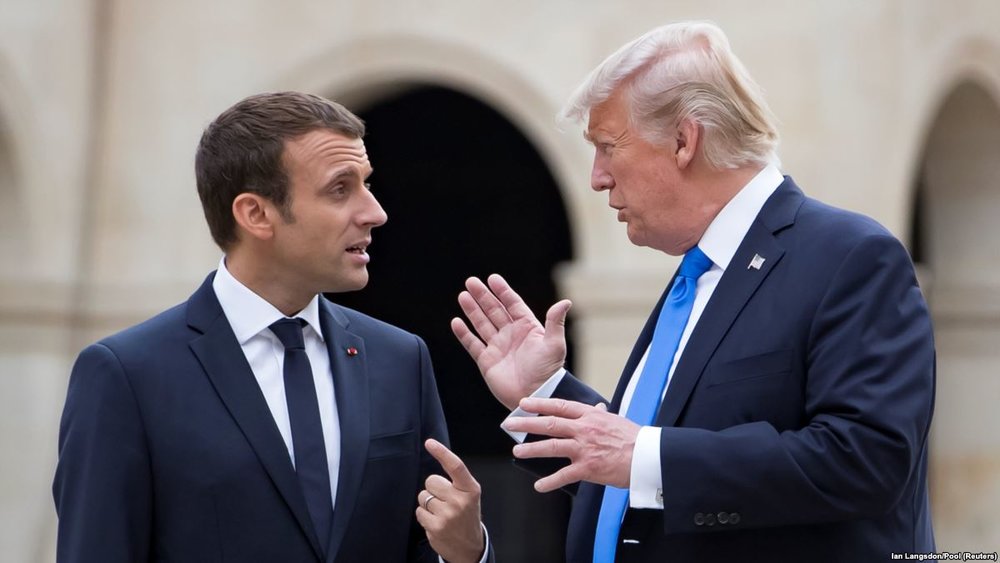Trump and Macron complementary roles
The joint nuclear game of Washington and Paris

TEHRAN - The evidences show that "Donald Trump" and "Emmanuel Macron", the presidents of the United States and France, have sought to redefine the "White House Policy towards the JCPOA". In last September and during the United Nations General Assembly, we saw the cooperation of Washington and Paris on how to deal with the nuclear accord.
Accordingly, Trump and Macron decided to manage and lead the process of "changing the JCPOA" using the legal capacities of the U.S. Congress. Macaron's words about the "likelihood of completing the JCPOA," and including the issue of Iran's missile power and the new time limitations against Iran's nuclear program in the context of the Joint Comprehensive Plan of Action, were indicative of this bilateral agreement between the White House and the Elysee Palace.
Following Trump's controversial speech about the JCPOA and his order to the Congress to review the nuclear deal in 2 months, Macron continued his negative maneuver in dealing with the missile program of the Islamic Republic of Iran. But the Congress wasn't able to come to a conclusion over the JCPOA by this time, and the vice president of the United States has announced the cooperation of the U.S. government and the Congress to approve a new law on Iran's nuclear deal. Mike Pence has said:
"The Trump administration and members of Congress are working on a new set of nuclear- and missile-related Iran sanctions that would replace the 2015 nuclear agreement that permits the Islamic republic to resume nuclear weapons development after ten years."
According to the vice president of the United States, Trump's administration and the Congress are preparing a law that if Iran starts trying to develop a nuclear bomb and missiles, all nuclear and missile sanctions will immediately apply against Tehran!
About 3 weeks ago, Emanuel Macron explicitly stated that "the JCPOA" is unchangeable. However, he still talks about completing the nuclear deal! What is certain is that completing the nuclear deal means changing this agreement. Macron knows well that a proposition called "completion of the nuclear deal" through an addendum, a supplementary agreement or even an interim agreement means a breach of the initial agreement.
In such a situation, the JCPOA will lose its value. Therefore, France, like the United States, seeks to change the nuclear deal, but with a different literature! Here the main question is: "How will Paris and Washington do that?" There are some points that need to be addressed in this regard:
First, the American authorities will first try to agree on a joint plan to "change the JCPOA". Over the past two months, Tom Cotton and Bob Corker, two Republican senators, have been struggling to persuade Congress to work in line with Trump's goals. But they failed in this regard. According to the Cotton-Corker joint plan, Iran's missile activities will be tied to the JCPOA, and if Iran prevents the IAEA from inspecting its military sites, the nuclear deal will be automatically canceled! Also, in the plan of these two American senators, the so-called Sunset clauses will be removed and the limits on Iran's nuclear program will become permanent! Obviously, all of these are obvious example of changing the nuclear deal. Anyway, Democrat senators believe that this plan is synonymous to the U.S. withdrawal of the JCPOA. This is the reason they haven't accepted it so far. Nevertheless, the joint talks between the Congress and the White House on this plan still continues.
Secondly, the Elysee Palace still has the task of maneuvering on the "completion of the JCPIOA" and proposing it as a common approach to the nuclear deal! This is while the term "completion of the JCPOA" has essentially no meaning other than "Changing the JCPOA". Emmanuel Macron, on the one hand, states that the nuclear deal is unchangeable and, on the other hand, calls for the completion of it, by including Iran's missile power and imposing permanent restrictions on Iran! Obviously, this contradictory approach is not acceptable at all. What is clear is that the slightest change in the content of the nuclear deal means the lack of commitment of the other party, or in other words, the official withdrawal of the P1 + 5 members of the nuclear deal.
Insisting firmly on this stance by our country's diplomacy system and foreign policy apparatus can counteract American-French joint action. The third point that should be taken into consideration here is about the nature France role in this regard. It should not be forgotten that Washington and Paris are completing a common puzzle. In other words, we shouldn't see the games of Paris and Washington separate in this field. Speaking of France as a "medium player" or an "independent player" would be a mistake in our foreign policy. Paris has now entered the controversial field as a "player completing the U.S. game." Meanwhile, the soft literature of the French authorities shouldn't deceive us so that we may ignore the danger of a sudden change in this country's conduct.
The reality is that the French president and its Foreign Minister are not going to have a similar approach like the previous government of the country (Hollande and Laurent Fabius) towards the nuclear deal, rather the same approach used by their former government in opposing to our peaceful nuclear activities will continue. What is currently important is the smart observation of Paris playing on the U.S. ground. Through this smart observation, we can successfully deal with their joint playing.
Leave a Comment